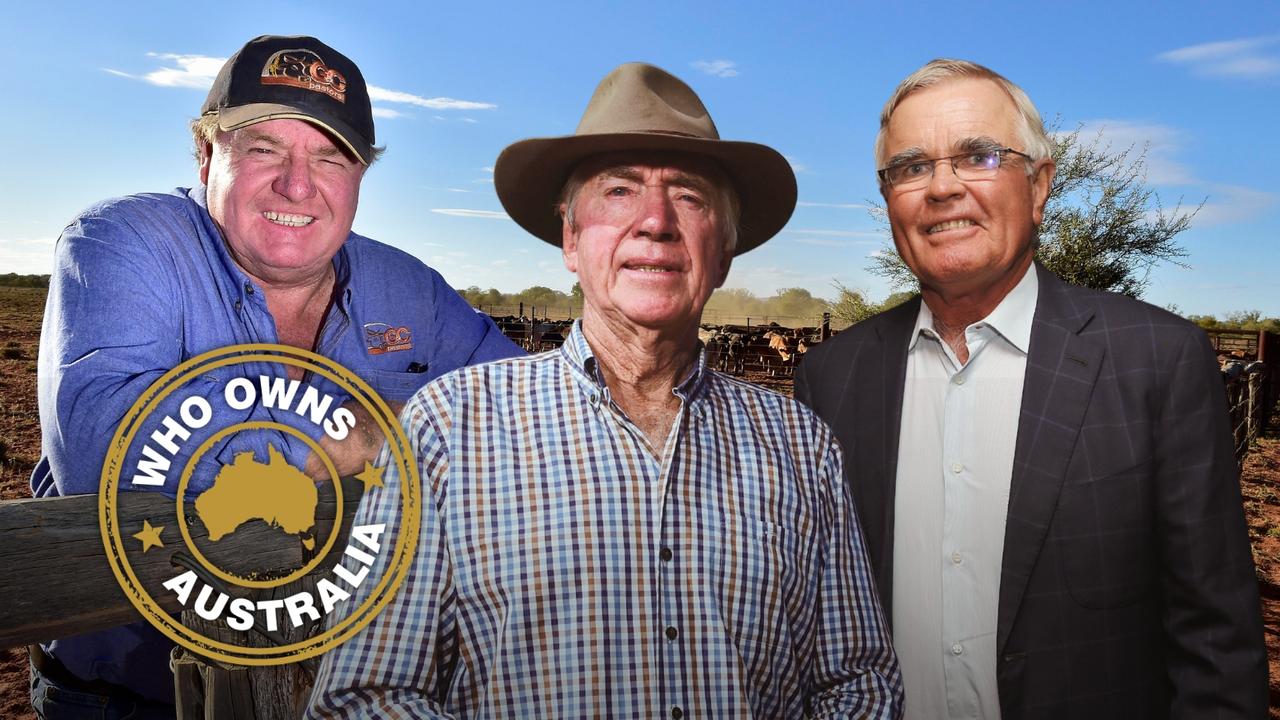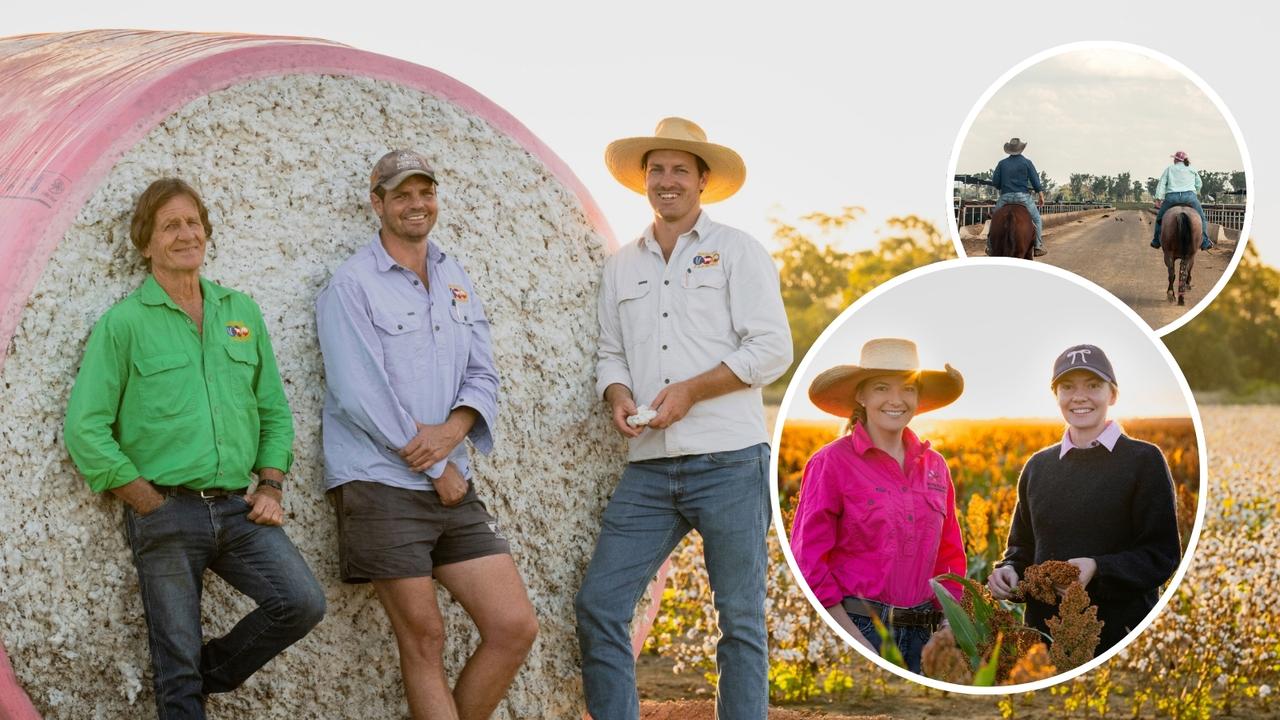Optiweigh, FarmLab, Zetifi: How farmers are profiting from agtech
A Western District farmer has made $100k in gains thanks to weight data measured in paddocks, proving the power of agtech.
A piece of unassuming technology sits in a paddock in western Victoria, where farm manager Robert Cooper runs 2200 Angus breeders and 25,000 composite ewes on a livestock property near Moyston.
The simple steel structure – in powder-coated blue with sturdy tyres and a tow bar – looks like a short livestock trailer just wide enough for a single cow. It has been left out in the pasture with a herd; seemingly forgotten.
But it is in exactly the right place, put there with purpose.
And it’s delivering mind-blowing productivity gains for Cooper, as well as other beef producers nationwide who are early adopters of the groundbreaking agtech.
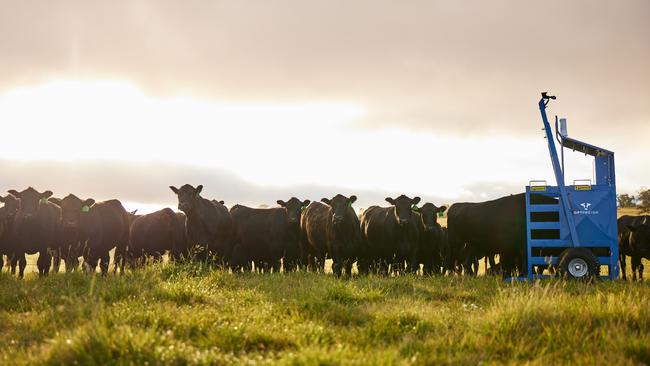
The machine is an Optiweigh mobile cattle scale. It weighs animals in paddocks while they graze, recording weights against each beast’s individual electronic ID, then, using a low-orbit satellite connection, delivers data wirelessly to Cooper’s phone every morning.
Optiweigh founder and NSW farmer Bill Mitchell started tinkering with a portable in-paddock scale idea a decade ago on his property near Armidale, in the Northern Tablelands. He was searching for a way to be more precise in measuring weight gain in his cattle-fattening enterprise.
“Weight tells you everything about a cattle business,” Mitchell says. “When they are ready for sale, how they are performing, how pastures are performing, what nutrition levels are like, if you have animal health issues; it is all about the weight.
“In trying to improve our operation we wanted to have more real-time information. And the only way we could get it was taking animals to the yards and weighing them. That is very time-consuming and very disruptive to the animals.
“The very first and clearest value that we got out of it was because we were able to put it into a mob of cattle and within three days we knew what the average weight was of that mob, what the spread of weights was and how much they had gained since the last time we were with them.
“And that really quickly translated into us being able to sell our animals heavier without risking overweights. We knew exactly when to sell them to maximise returns.”
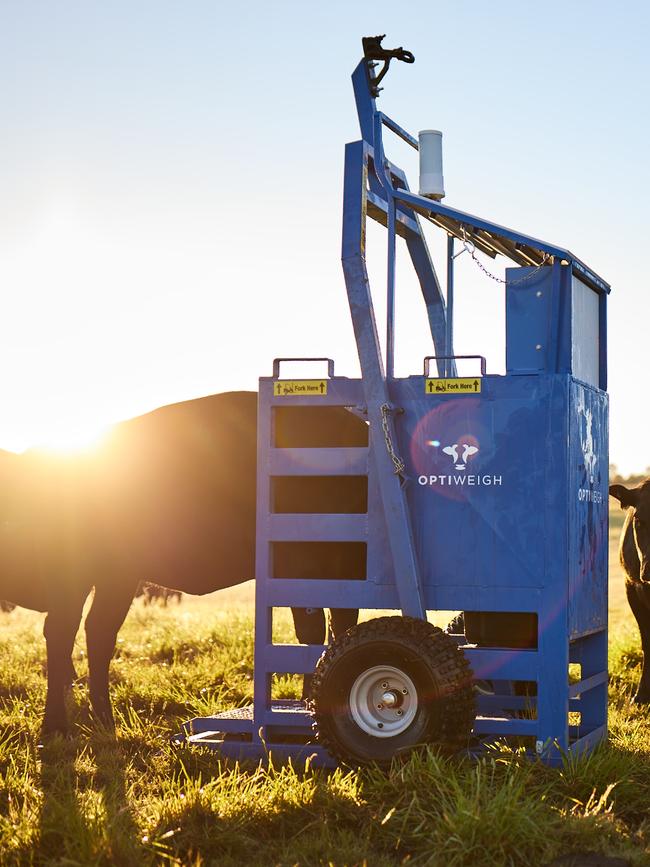
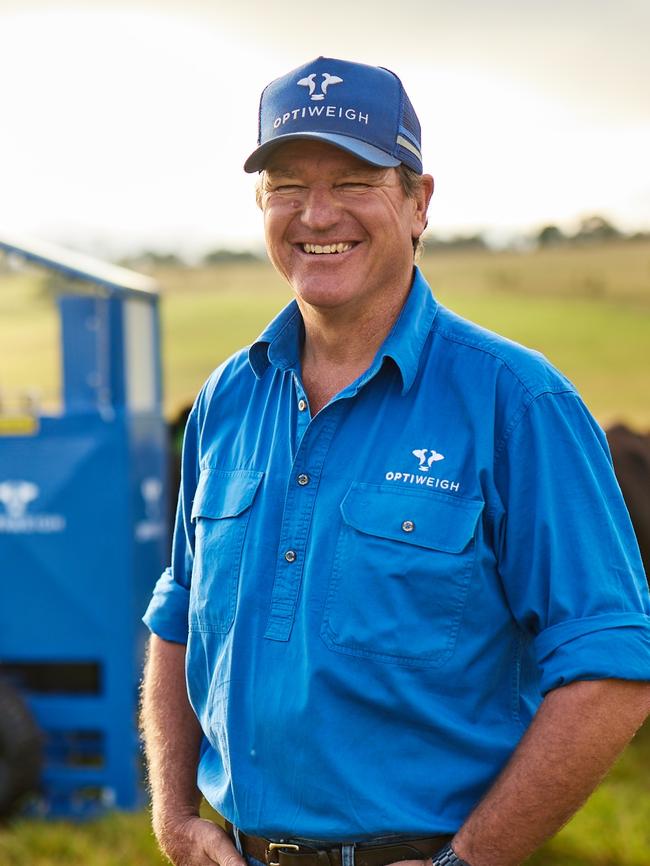
Cooper says his Optiweigh has changed the way he manages cattle. “It is ensuring that what I’m seeing in the paddock is being backed up with actual weight data without having to take those cattle and put them on to a traditional scale,” he says.
Optiweigh data not only tells Cooper precisely when cattle will be ready for market, but it has also laid bare hundreds of thousands of dollars of production gains that his herd hasn’t been making, due to the stressful process of being penned for weighing. After a recent yarding of 1800 cattle, Cooper’s Optiweigh data showed the animals each lost 10kg during the process of walking to the yards, then took 15 days to return to their expected gain rate of 0.9kg a day.
That equated to an additional lost opportunity of 10kg gain per beast, valued at $108,000 across the mob.
“It gives us intel from the paddock that we were sort of guessing at in the past,” Cooper explains.
“It potentially changes the carrying capacity of the land; changes the enterprise mix; gives us really good data on our line of cattle which shows where they sit on a benchmark status within the Angus herd. It also opens the door to other tech that enables individual management of cattle on a large scale.
“These things were pie-in-the-sky stuff. Now they are real and are actually happening.”
Cooper is also trialling an Optiweigh prototype designed for sheep, which provides similarly powerful data; data that is an example of the revolutionary power of Australia’s burgeoning agtech sector.
GLOBAL OPPORTUNITY
The global agtech sector is attracting huge investment – topping $50 billion in 2021.
In Australia, investment in agtech has grown by more than 10-fold over the past five years, from $US19 million in 2018 to $US245.7 million last year, peaking in 2021 at $US360.4 million according to figures from AgFunder.
Despite the year-on-year dip of more than $US100 million, AgriFutures Australia managing director John Harvey says Australia is cultivating an exciting agtech “ecosystem” with investors, entrepreneurs, government, corporations and producers all playing important roles.
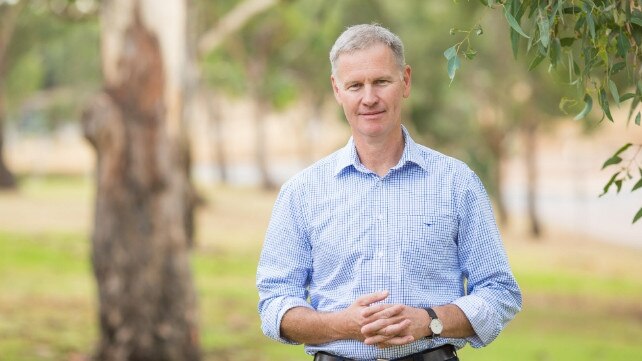
Crucially, the emergence over the past four years of Australian agtech-specific venture capital funds, such as Tenacious Ventures and GrainInnovate, is putting local start-ups in a better position to scale up.
“They are located in Australia so they can support the start-ups they are investing in, both financially, with management advice, and with connections,” Harvey says. “It also gives overseas investors confidence to invest.
“The Australian market is a reasonable size. But it is not large enough on its own for a lot of these technologies to be long-term viable and attract the sort of investment to get them to go to scale.”
A global mindset is needed, he says, and AgriFutures is devoted to making sure the ecosystem supports solutions for international markets. It has set up an online hub called GrowAg, where users can connect with research and investment opportunities. And its flagship agri-innovation conference, EvokeAg, held in Adelaide in February, attracted visitors from around the world. Optiweigh founder Bill Mitchell was there, as were FarmLab founder Sam Duncan and Zetifi’s Dan Winson.
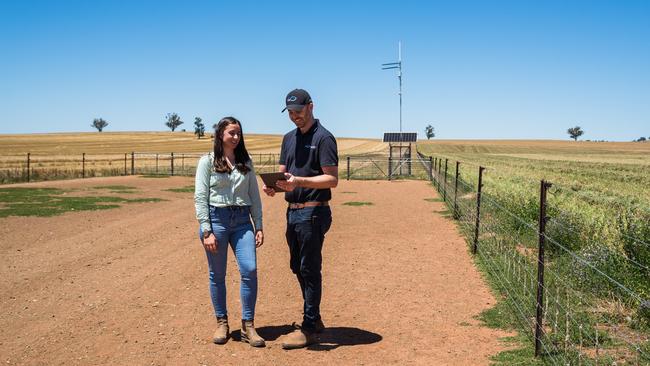
Mitchell has sold more than 400 Optiweigh units, at $17,500 each and an annual $240 subscription, to Australian farmers as far north as Kununurra in Western Australia south to King Island. He has also cracked the overseas market, with sales to New Zealand, Canada, Wales and Uruguay. In every cattle-farming region, its value proposition is the same.
Mitchell says farmers have always been interested in adopting technology that offers a clear return on investment. The challenge for developers, including himself, has been to solve actual on-farm problems with an affordable solution.
“You have to remember that farms are a constant source of capital drain,” he says. The recent advent of more economical connectivity tech has been a game-changer for Mitchell and other start-ups. “Our first major hurdle was connectivity, because feedback very quickly was Optiweigh had to be connected,” says Mitchell, who designed the units on-farm using his own capital during the drought, and started commercialising the idea in 2019.
“Most cattle don’t live where there is mobile phone service. It was only once we got on to Swarm’s satellite solution we found we had something that fit the bill.”
Swarm provides low-bandwidth satellite connectivity for a small monthly fee. Its network covers every point on earth.
CONNECTIVITY IS CRUCIAL
Zetifi is another start-up that is improving connectivity in rural areas.
Chief executive Dan Winson and his team have developed two products – ZetiRover and ZetiCell – that extend coverage of existing networks to deliver more reliable broadband on rural properties.

“Most farms have some network coverage, just not enough to do what they need to do,” says Winson, a network engineer from Wagga Wagga.
“Farmers were crying out to have this problem solved. We’ve worked with various sectors … transport, logistics, mining and resources, parks and wildlife in remote locations. Honestly, the problem is just more urgent in farming.
“There is a direct link between connectivity and safety, productivity and quality of life on a farm.”
Zetifi has notched up millions of dollars in sales of its beta products, and raised $12 million in a Series A funding round. With offices in Melbourne, Sydney and New York, Winson sees a global opportunity.
So too does FarmLab founder Sam Duncan, whose soil testing and analysis software launched in 2021.
Farmlab’s services and software have been in development since 2016, with Duncan pitching his business idea at the first EvokeAg conference in 2019. Four years later, and $8.4 million worth of grants secured, FarmLab has found its niche helping farmers analyse soil and vegetation data to underpin soil carbon projects.
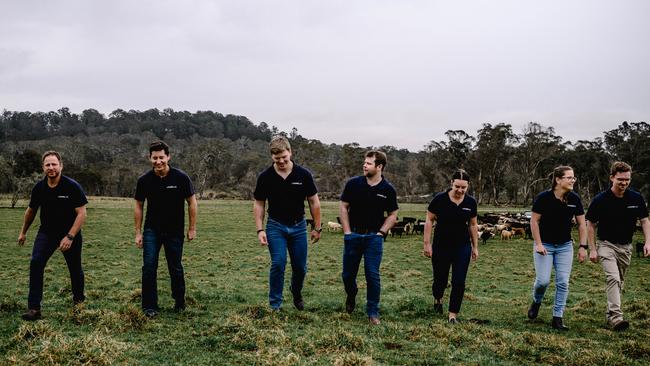
“Now you have a regulated carbon market and farmers need to prove that what they are doing has an impact, the best way to do that is through soil testing,” Duncan says.
Finding investors to help develop the software has been a struggle. “From a funding perspective, we need investors who are happy to play the long game, and willing to wait,” he says.
Now expanding into the US in progress, he’ll again be looking for capital. In the meantime, the value of his tech will ultimately be measured by the returns it offers customers. With nearly 50 agribusiness clients that farm across 887,000 hectares, FarmLab’s track record is strong.
Back in the Western District, Cooper says with the recent proliferation of choice, he picks agtech solutions carefully, but if producers aren’t embracing data-driven decision making, they risk being left behind.
“We really have to be numerically driven,” he says. “Not just looking at it and saying ‘I think it’s right’.
“‘I think it’s right’ doesn’t really cut it anymore. It has to be, ‘I know it’s right because here is the numbers-based evidence’.”



